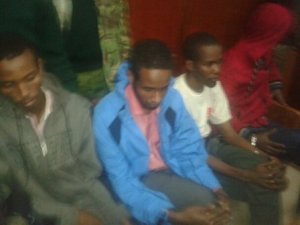 Four people were charged Monday, accused of involvement in the attack on the Westgate mall in Kenya, but each pleaded not guilty.
Four people were charged Monday, accused of involvement in the attack on the Westgate mall in Kenya, but each pleaded not guilty.
The Somali terror group Al-Shabaab, an affiliate of al Qaeda, claimed responsibility for the bloody four-day siege at the upscale mall in Nairobi, during which at least 67 people were killed. The attack began on September 21.
Questions remain about those who carried out the attack and the response by security forces.
Monday's court appearance by the four defendants only created new questions. Authorities said they weren't even sure of two of the defendants' names.
All four are believed to be from Somalia, but authorities said two of them had Kenyan identification cards and citizenship papers. The hearing was delayed two hours to find a translator when the defendants claimed to be unable to speak Swahili or English.
They were charged with committing a terrorist act. Some face related charges of aiding attackers before, during or after the attack.
They were denied bail. Their trial is expected to begin next week.
Changing accounts
The exact number of people Kenyan authorities say were involved in or connected to the deadly assault has fluctuated.
As the attack unfolded, Kenyan officials said that as many as 15 gunmen were involved.
On the fourth day of the siege, as the security operation wound down, President Uhuru Kenyatta said five terrorists had been killed and 11 suspects were in custody.
Last month, the Kenyan military said four gunmen died when part of the mall collapsed. It's unclear how many civilians and terrorists may still be buried beneath the concrete chunks of the collapsed section of the mall.
Evidence of torture
The Norwegian security service, PST, has said it is investigating suspicions that a Norwegian citizen took part in the attack.
Kenyan authorities say they are investigating allegations that some Kenyan soldiers looted stores in the mall as they searched for the attackers.
Surveillance video from the mall showed gunmen casually shooting some civilians. They reportedly also tortured some hostages, according to military doctors who saw evidence of severed hands and noses. Some hostages had been hanged, according to the doctors.
U.S. targets Al-Shabaab
In recent weeks, U.S. Navy SEALs sought but failed to capture Mohamed Abdikadir Mohamed, said to be one of the most dangerous Al-Shabaab commanders. He is also known as Ikrima.
But a U.S. military drone strike in southern Somalia late last month killed two suspected Al-Shabaab members, U.S. officials said.
One of those killed was described by one of the officials as Anta, considered a top technical and explosives expert for the group.
Portland and Seattle
Free Subscription to Breaking News
Free Subscription to Breaking News




















































































































































































































































































































































